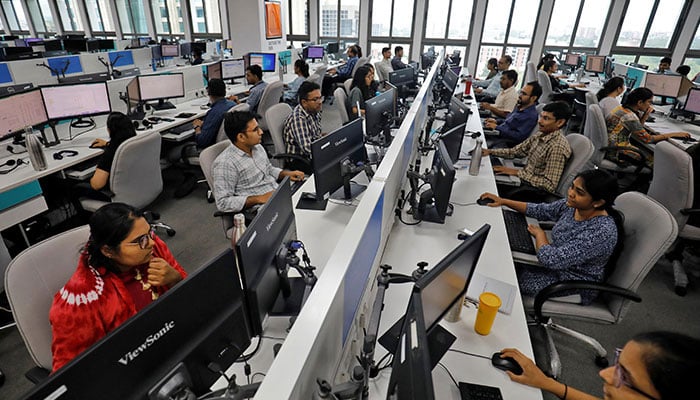Work culture in Pakistan
LAHORE: The minimum wage system in Pakistan, coupled with loyal workforces in family-owned businesses and hierarchical structures, discourages open communication and denies workers fair compensation. This has led to a demotivated workforce and low productivity.
Gender inequality and a lack of professional training further hinder productivity. The prevalence of informality across many sectors results in inconsistent workplace policies. High employee turnover is a recurring issue, driven by dissatisfaction with pay, lack of growth opportunities or better prospects abroad.
Motivating workers requires a mix of financial and non-financial incentives. Employers must publicly acknowledge employees’ achievements and contributions while providing clear career growth opportunities through training and promotions. Workers thrive in collaborative and supportive cultures where they can take ownership of their work. Flexible working hours and mental health support are equally crucial. Including employees in decision-making processes and valuing their input can significantly boost morale and motivation.
In a positive work environment, job satisfaction often takes precedence over salary as it directly impacts well-being and engagement. However, salary remains vital for meeting basic needs. Ideally, fair compensation should align with meaningful work and a supportive atmosphere. Satisfied employees value stability and positive relationships with colleagues and supervisors, prioritising job satisfaction over marginal pay increases. Conversely, dissatisfaction with pay, career growth or work-life balance often makes employees more receptive to external offers.
Discrimination -- whether based on gender, age, ethnicity, or favouritism -- is a pervasive issue in Pakistan’s workplaces. It erodes morale, fosters resentment, and reduces productivity, leading to high turnover rates and a breakdown in trust. Addressing discrimination through equitable treatment is critical for maintaining team cohesion and motivation.
Another neglected aspect of Pakistan’s work culture is empathy towards employees’ personal challenges. Managers who offer tailored support, such as flexible hours or additional resources, improve morale and build trust. However, this must be done carefully, respecting privacy and boundaries.
Merit-based preferential treatment encourages accountability and excellence. It rewards hard work and professionalism while motivating others to improve. Transparency in evaluation criteria is essential to prevent perceptions of favouritism.
High turnover often signals underlying issues, such as poor management, low job satisfaction, uncompetitive compensation, limited growth opportunities, or a toxic workplace culture. Addressing these problems is vital for talent retention and enhancing a company’s reputation.
India’s dynamic work culture benefits from a booming tech and service industry, with a strong focus on innovation, meritocracy and professional development. Substantial investments in training and employee engagement have enhanced productivity. However, high stress levels, long working hours and burnout remain significant challenges.
In Bangladesh, rapid industrial growth, particularly in textiles, has fostered a disciplined and hardworking workforce. Collective worker movements have improved working conditions in some sectors. Yet, inadequate focus on worker well-being and limited career advancement opportunities are weaknesses.
Sri Lanka’s work culture emphasises inclusivity and gender equality in many industries. Stable employment in strong export sectors, such as tea and textiles, contributes to relatively low turnover. Employees value job security and loyalty in the smaller economy, fostering a strong sense of workplace commitment.
By addressing these challenges and leveraging lessons from regional counterparts, Pakistan has the potential to transform its work culture into one that fosters productivity, loyalty and innovation.
-
 'Bridgerton' Season 4: Showrunner Talks About Violet's Steamy Romance
'Bridgerton' Season 4: Showrunner Talks About Violet's Steamy Romance -
 John Tesh Recalls ‘uncomfortable’ Backlash Over ’70s Romance With Oprah Winfrey
John Tesh Recalls ‘uncomfortable’ Backlash Over ’70s Romance With Oprah Winfrey -
 Meghan Markle, Prince Harry Problem Was Not ‘work’ During Time With Royals
Meghan Markle, Prince Harry Problem Was Not ‘work’ During Time With Royals -
 Meta Strikes Multi-billion-dollar AI Chip Deal With Google: Will The New Collaboration Pay Off?
Meta Strikes Multi-billion-dollar AI Chip Deal With Google: Will The New Collaboration Pay Off? -
 Gracie Abrams Breaks Silence After Losing 2026 BRIT Award
Gracie Abrams Breaks Silence After Losing 2026 BRIT Award -
 Deon Cole Takes Swipe At Nicki Minaj In Mock Prayer During NAACP Image Awards Monologue
Deon Cole Takes Swipe At Nicki Minaj In Mock Prayer During NAACP Image Awards Monologue -
 Jennifer Garner Reveals The Actress Who 'carried Through Things'
Jennifer Garner Reveals The Actress Who 'carried Through Things' -
 Shamed Andrew ‘awful’ Time As Trade Envoy Is Laid Bare By Insider
Shamed Andrew ‘awful’ Time As Trade Envoy Is Laid Bare By Insider -
 Belgium Seizes Suspected Russian Shadow Fleet Tanker
Belgium Seizes Suspected Russian Shadow Fleet Tanker -
 Liza Minelli Makes Bombshell Claim About Late Mother Judy Garland’s Struggle With Drugs
Liza Minelli Makes Bombshell Claim About Late Mother Judy Garland’s Struggle With Drugs -
 Shipping Giant Maersk Halts Suez Canal, Bab El-Mandeb Sailings Amid Escalating Conflict
Shipping Giant Maersk Halts Suez Canal, Bab El-Mandeb Sailings Amid Escalating Conflict -
 Matthew McCoughaney Reveals One 'gift' He Achieved With Losing Nearly 50 Pounds
Matthew McCoughaney Reveals One 'gift' He Achieved With Losing Nearly 50 Pounds -
 'Scream 7' Breaks Box Office Record Of Slasher Franchise: 'We Are Grateful'
'Scream 7' Breaks Box Office Record Of Slasher Franchise: 'We Are Grateful' -
 Bolivian Military Plane Crash Death Toll Rises To 20
Bolivian Military Plane Crash Death Toll Rises To 20 -
 'Sinners' Star Blasts Major Media Company For 2026 BAFTAs Incident
'Sinners' Star Blasts Major Media Company For 2026 BAFTAs Incident -
 Inside Scooter Braun, Sydney Sweeney's Plans To Settle Down, Have A Baby
Inside Scooter Braun, Sydney Sweeney's Plans To Settle Down, Have A Baby




